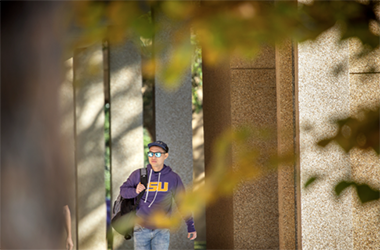A Guide to Rights & Responsibilities
This guide provides LSU students and supporters, faculty and staff, with key insights into disability laws in postsecondary education, including legal obligations, confidentiality, rights and responsibilities, and how to navigate grievance and appeal procedures.
Rights & Responsibilities
Students have the right to:
- Confidentiality
- Expect all disability-related information to be treated confidentiality.
- Accommodations
- Receive appropriate accommodations in a timely manner from faculty or DS after following proper registration procedures.
- Have the opportunity to meet privately with faculty to discuss needed accommodations and any other concerns.
- Appeal decisions regarding accommodations and auxiliary aids.
Students have the responsibility to:
- Provide documentation
- Provide DS with appropriate documentation of the disability. Maintain confidentiality.
- Go to the instructor’s office hours or make an appointment with the instructor to facilitate privacy when requesting accommodations.
- Regarding accommodations:
- To initiate request for specific accommodations in a timely manner, preferably earlier in the semester.
- To follow procedures with faculty and DS in order to get the appropriate accommodations. An Examination Request must be submitted for every exam taken in DS’s Testing Center.
- To inform DS of the materials you need in alternate format as soon as possible.
- To notify faculty/DS immediately when an accommodation is not being provided completely or correctly.
- To notify faculty/DS immediately when a decision has been made to not use an accommodation or the accommodation is no longer needed.
- To provide for your own personal living needs or other personal disability-related needs. For example, coordinating services of personal care attendants or requiring homework assistance are a student’s responsibilities and not the responsibilities of DS.
- Communicate
- Act as your own advocate. Work with counselors on developing advocacy skills and communicating your specific needs and accommodations to faculty.
Please keep in mind that DS is the only office designated to review disability-related documentation and determine eligibility for appropriate accommodations.
Disability Services has the right to:
-
Request documentation: receive appropriate documentation from the student prior to the accommodations being initiated.
-
Review eligibility for services: assess documentation to determine appropriate accommodations, adjustments, and/or auxiliary services.
Disability Services has the responsibility to:
-
Maintain confidentiality
-
Protect all disability-related information as confidential.
-
Meet with the student privately in an accessible location to discuss disability-related needs.
-
-
Facilitate accommodations
-
Provide appropriate accommodations in collaboration with the faculty and student.
-
Administer testing accommodations in a secure and monitored environment.
-
Ensure testing materials are in accessible formats once the faculty member and student notifies DS.
-
-
Communicate procedures clearly to the student and faculty.
-
Advocate
-
Assist students with disabilities in understanding their strengths.
-
Provide students with skills to become self-advocates.
-
Faculty & Staff have the right to:
- Request verification of a student’s eligibility for any requested accommodations.
- Such verification will be in the form of an accommodation request through the student's access portal. Disability Services is the only office designated to review disability documentation and determine eligibility for appropriate accommodations. Faculty should not view this documentation.
- Expect the student to initiate accommodation requests.
- If the student is taking their tests at Disability Services Testing Center, expect Disability Services to administer exams in a secure and monitored environment.
Faculty & Staff have the responsibility to:
- Accommodate
- Identify and establish essential functions, abilities, skills, and knowledge of your courses and evaluate students on this basis. Students with disabilities should meet the same course expectations as their peers. Disability Services strongly recommends this information be addressed on the syllabus.
- Provide accommodations only to students who are registered with Disability Services. It is NOT your responsibility to provide accommodations to students who are not registered.
- Use a syllabus statement and class announcements to invite students to disclose their needs.
- Act immediately upon getting a student’s request for accommodations, and contact Disability Services if unsure about request. Meet with students to discuss needs. Complete the Testing Agreement, which facilitates examination accommodations and should be completed by the student and faculty member collaboratively.
- If a student needs alternative media, please provide Disability Services with your syllabus, textbooks, etc. well before classes begin (5 weeks prior to the start of the semester is recommended). With such timely consideration, students with disabilities who need alternative media accommodations and instructional access will be served. Converting print materials is both labor and time intensive. Alternative media may be print material in Braille, on audiotapes, scanned onto discs, or large text.
- Work to ensure that all audiovisual materials used in class are accessible (e.g. captioning or transcripts)
- Consider incorporating principles of Universal Design for Learning in your teaching. Maintain confidentiality.
- Treat and protect all disability-related information as confidential medical information. For example, keep printed items, such as Testing Agreements, Faculty Notification Letters or emails regarding student disability-related information in a protected location.
- Communicate
- Clearly communicate your testing procedures with the student and with DS Testing Center by completing a Testing Agreement upon request.
- Consult with students with disabilities and DS in providing appropriate accommodations. Understand Student Rights & Responsibilities.
Important Note
Faculty do NOT have the right to ask students if they have a disability. For those students with documented disabilities, faculty do NOT have the right to ask the nature of the disability. However, if students choose to disclose their disability, this information should be treated confidentially.
Appeals & Grievances
If there is a disagreement between you and your instructor regarding an accommodation request, we encourage you to try resolving it together first. If a resolution cannot be reached, our Disability Services staff can facilitate a discussion involving both the student and the instructor. Should this discussion not resolve the issue, the matter will follow the Student Grievance Procedures outlined in the LSU Code of Student Conduct.
At Louisiana State University, we are dedicated to creating an educational and work environment that supports the growth and success of every individual. To honor this commitment, we've established procedures for students to address grievances within our community. It's important for every student to be familiar with, and adhere to, the LSU Code of Student Conduct. Faculty and DS also have a role in these grievance procedures, especially if a student feels discriminated against in the classroom or through engaging with DS staff.
- Complaints of DS staff should be shared written or verbal to that staff member's direct supervisor.
- Complaints with other LSU Departments or Programs must be resolved between the student and the university employee representing the department with assistance from DS. If the student believes all efforts to resolve the complaint have proven unsuccessful, they may file a formal grievance as outlined in LSU PS-26.
- External Grievance Options
Appeal Procedure
Our Disability Services team at Louisiana State University is dedicated to fostering an environment where every student can fully engage in the educational opportunities, activities, and services we offer. We determine eligibility for accommodations and identify reasonable accommodations through an interactive process. If you disagree with a decision regarding your eligibility or accommodation request, you can follow this appeal procedure:
- Discuss with Your Access Coordinator (AC): If you have concerns about a decision on your accommodations or eligibility, your first step is to meet with your Access Coordinator (AC). They will listen to your concerns, gather information, and work with you to try to resolve the issue.
- Review by the Director of Disability Services: If your concern cannot be resolved with your AC, you can appeal to the Director within 10 business days of being notified. Appeals must be in writing via email or print and sent to the Director. Your AC will present all available information to the Director. The Director will then communicate a decision to you.
- Final Review by the ADA Coordinator: If you're still dissatisfied with the Director's decision, you can appeal to the ADA Coordinator within 10 business days of the Director's decision in writing via email or print. The ADA Coordinator will communicate the final decision to you.
Should you have any questions about this procedure, please reach out to your Access Coordinator. We're here to support you every step of the way.
If you believe you have been discriminated against based on your disability, you have several options to address your grievance. These procedures are detailed in the LSU Policy on Discrimination and Discrimination Appeals.
General information and options for reporting can be found on the LSU Division of Engagement, Civil Rights & Title IX reporting page.
Confidentiality
Disability-related documentation is confidential and is not released to anyone outside the accommodation process or direct chain of command, with the following exceptions: the student gives Disability Services a signed release to share disability-related information with the person(s) named on the release; as Disability Services is required and/or permitted by law and/or court order; the student is a direct threat to themselves and/or others; if a student makes a disability-related grievance or appeal. Information regarding a student’s disability will be released on a need-to-know basis.
When a student with a disability requests accommodations, they understand that some disability-related information may be provided on a need-to-know basis to university personnel to ensure that the student will receive appropriate accommodations. In most instances, university personnel must know only what accommodations the student must be provided and that the student has been through the disability documentation review process with DS. Otherwise, university personnel cannot access information regarding the nature of a student’s disability.
Student Record Requests
Students with disabilities have a right to review their DS record. This can be arranged by scheduling an appointment with a DS Access Coordinator. DS does not provide copies of documentation. DS will scan documentation to create an electronic student file upon receipt of student documentation. The original hard copy of the documentation will then be destroyed.
Copies of Documentation
Students are encouraged to maintain a copy of their documentation upon registration. Original copies of documentation should be obtained from the originator of the documentation. DS will retain an electronic copy of all information within a student’s file for five (5) years. The file may be deleted once the student is considered inactive for five years.
Laws & Policies Related to Disability Services
A student with a disability is entitled by law to equal access to University programs. Two federal laws protect persons with disabilities in postsecondary education: the Rehabilitation Act of 1973 (Pub. L. No. 93-112, as amended), the 1990 Americans with Disabilities Act (Pub. L. No. 101- 336), and the ADA Amendments Act (Pub. L. No. 110- 325).
Title V of the Rehabilitation Act of 1973 is generally regarded as the first civil rights legislation on the national level for people with disabilities. Section 504 of the Rehabilitation Act is a program access statute. This statute prohibits discrimination based on disability in any program or activity offered by an entity or institution receiving federal funds.
Section 504 (as amended) states:
No otherwise qualified person with a disability in the United States . . . shall, solely based on disability, be denied access to, or the benefits of, or be subjected to discrimination under any program or activity provided by any institution receiving federal financial assistance.
LSU's Policy Statement 26 (PS-26) affirms the University's commitment to equal opportunity for persons with disabilities without regard to disability in the areas of recruitment, admission, participation, treatment, or employment in the programs and activities operated and sponsored by the University.
Class attendance is extremely important and may be considered an essential component of the course or program. Consideration for absences as an approved accommodation only applies to non-Law students and if a class is missed for disability-related reasons. If you miss class, you are responsible for contacting your instructor and making up any missed work as soon as possible.
Policy Statement 22: Student Absence from Class
While students are expected to attend all classes and complete all exercises and assignments, including those that may take place in class, PS-22 establishes valid reasons for absences; provides for instructors to work with students to make-up missed work in certain circumstances; and outlines procedures for the granting of excused absences and requesting travel insurance for student trips.



